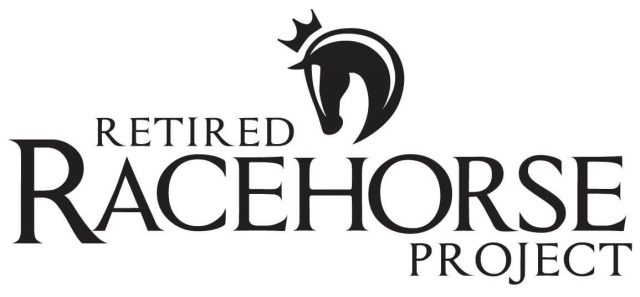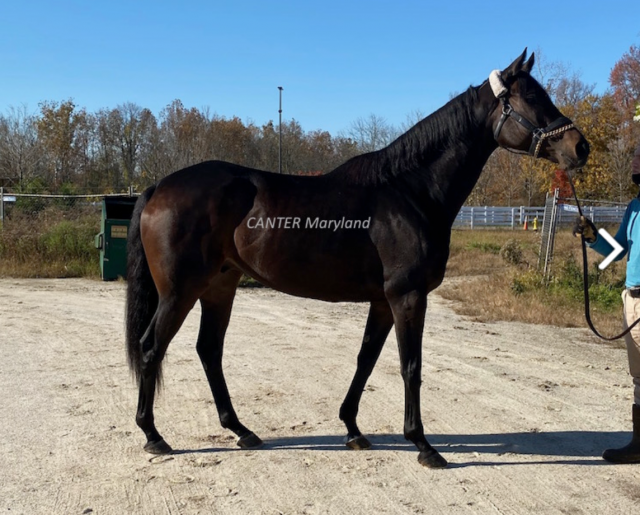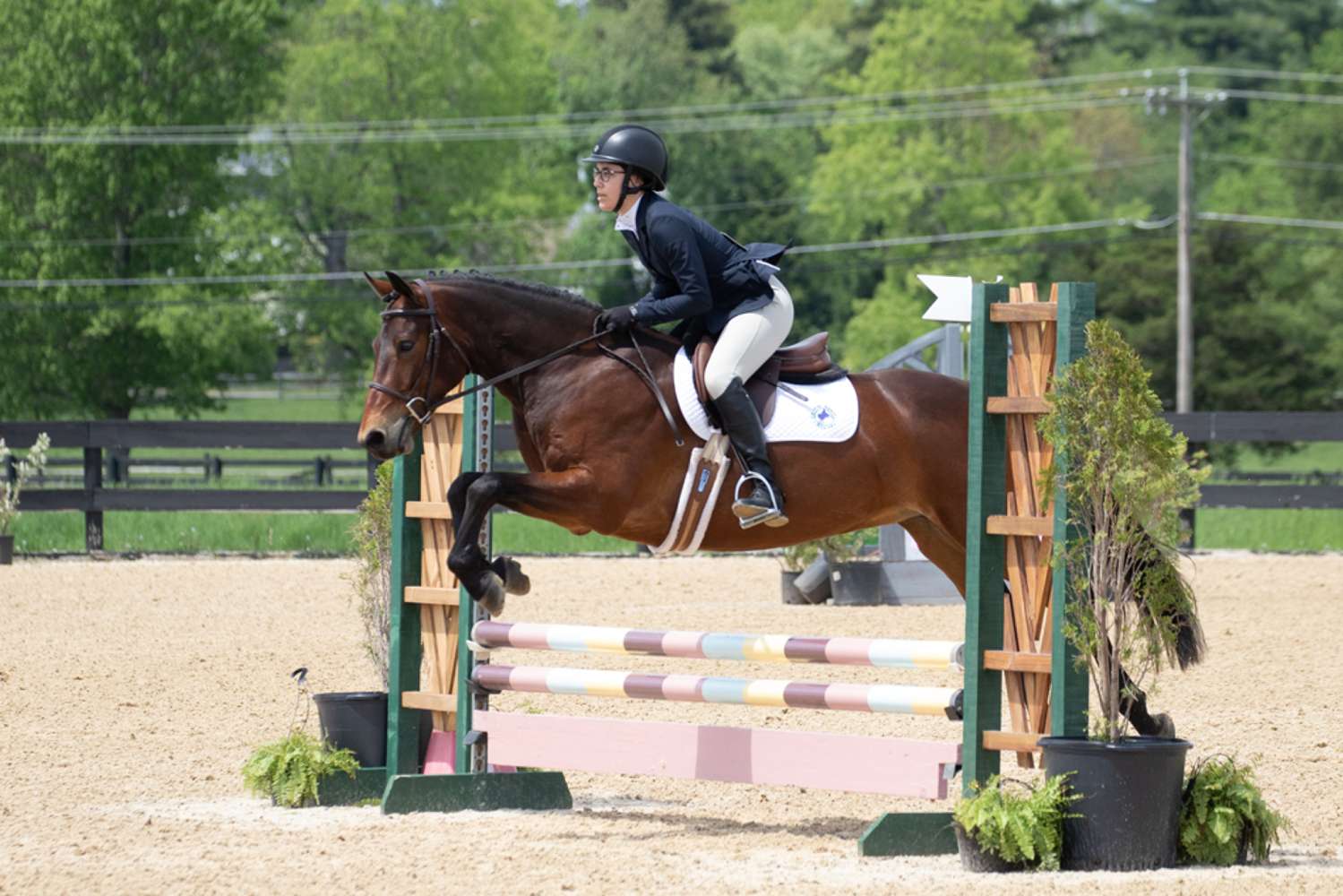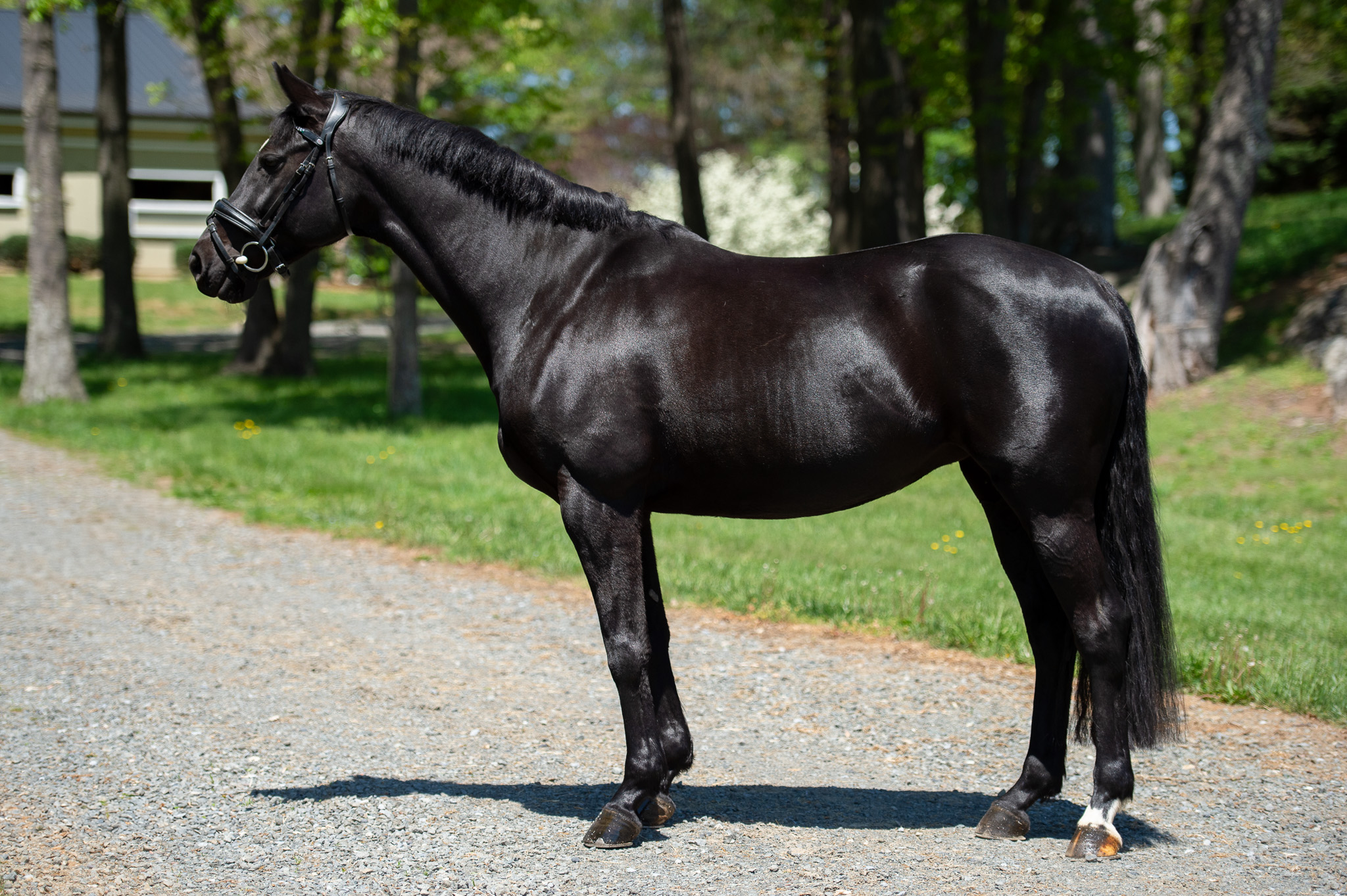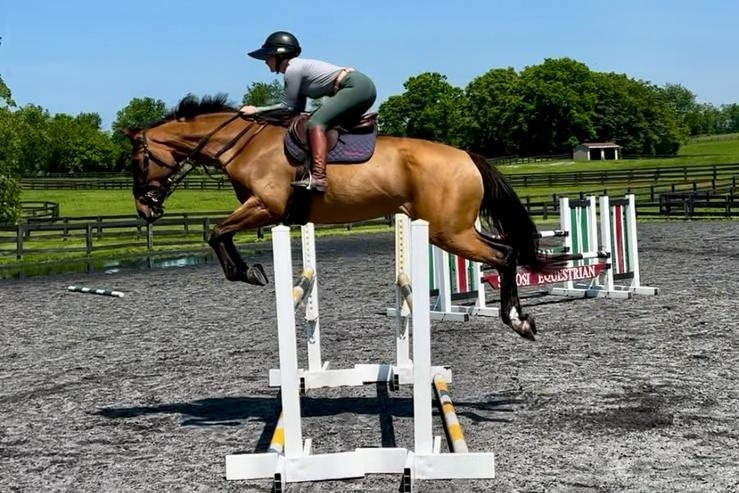The full FEI Eventing Committee report which was released following the FEI General Assembly is available here.

FEI President Ingmar De Vos (R) and Secretary General Sabrina Ibáñez at the FEI Headquarters in Lausanne (SUI). FEI/Richard Julliart Photo.
Given the current Covid-19 pandemic situation the Eventing Committee met for monthly videoconference calls between March November 2020, led by the Chair David O’Connor and attended by all the Eventing Committee Members and FEI Eventing Department. The Eventing Committee videoconference calls included many discussions to finding solutions to the ramifications of the Covid-19 virus in order to encourage the organization of eventing competitions, Nations Cup, and Championships.
The different National Governments’ decrees in most countries on Covid-19 countermeasures in regard to mass gatherings and travel restrictions had led to most of eventing competitions being canceled worldwide from March until July 2020. Return-to-play had started to resume from July with most regular events in the calendar taking being organized without spectators and with Government and FEI Return-to-Play policies in place.
COMMITTEE MEETINGS
The main points discussed during the 2020 Eventing Committee videoconference calls were:
- Olympic Games: During the Eventing Committee Conference Calls, official communications from the IOC had been published to inform that due to the Covid-19 pandemic, the Olympic Games Tokyo 2020 were to be rescheduled to the following year, reflecting the 2020 dates. Most deadlines would be reviewed to closely reflect the dates planned for 2020 with a year’s delay. Together with the other disciplines, the Eligibility requirements had been reviewed to take into account the additional year. The IOC had equally confirmed that all Nations having already achieved an Olympic Qualification quota place would retain this despite the postponement of the Games.
- Covid-19 impact on eventing: An Eventing Calendar Task Force, one of the eight discipline-specific task forces, had been created by the FEI to evaluate the impact on the FEI Calendar and propose ways of mitigating Covid-19 effects on the discipline (i.e. qualification events for the postponed Olympic, Continental Games, Championships, Nations Cup Series, 2020 organizational requirements and Calendar) and to provide proposed solutions to the FEI Secretary General and the Board. The Eventing Task Force held its first meeting via videoconference on 24 April 2020.
- Covid-19 impact on officials and athletes: The Board (FEI Board Emergency resolution July 21, 2020) agreed to extend the exemption that is currently in place for Australia and New Zealand to all countries. With this exemption, which would be reviewed end December 2020, foreign official requirements would not be compulsory, for CCI4* Long & short formats however two (2) Judges, Technical Delegate and Course Designer would need to be selected from the Level 3 lists.The Eventing Athlete Categorization used to determine eligibility requirements for events according to the rules are calculated on July 1, 2020 and was based on an eight-year rolling period. Considering the current situation and the lack of qualification opportunity for athletes in 2020, the Eventing Committee agreed to take 8.5 years into account for the July 1, 2020 Athletes Categories review, to be reviewed for an extension by the Eventing Committee for the next Category review on January 1, 2021.
- Covid-19 Eventing Specific Guidelines: The FEI Policy for Enhanced Competition Safety during the Covid-19 Pandemic – Effective for FEI Events held as of July 1, 2020, has been published on the FEI website as a guide to help Organizing Committees with Return to Competition during the pandemic. The Covid-19 Eventing discipline Specific Guidelines had been finalized with the input of the Committee and Organisers. This document aimed to provide OCs with detailed guidance for the management of FEI Eventing Events during the Covid-19 pandemic.
In addition to COVD-related matters, the Eventing Committee discussed:
- Risk Management: Measures and recommendations of the Risk Management Report were reviewed including improvement of Horse injury reporting, EquiRatings®’ Horse Form Index studies and use, clarification of Rotational and Torsional fall, Frangible Standard 2.0 with the introduction of the kettlebell pendulum test and new MIM clip to be fixed at an angle (yellow clip). (details below under sections 4 and 5)
- Education: The revision of the Officials Education program to line up with the FEI Education Departments all discipline approach was on-going, as well as the redefinition of Officials’ roles and responsibilities by the Eventing Officials Education Working Group. The criteria of appointment of Eventing Overall Course Director, the composition of the new Eventing Officials Education Working Group and the adjustment proposals of the CES System to the current circumstances were reviewed.
- Eventing Documents Supporting Rules: The Cross-Country Guide for Officials, Memorandum, and Equipment & Tack FAQ had been reviewed throughout 2020, finalized and published on the FEI website.
- FEI Eventing World Challenge: During the first Eventing Committee Videoconference of the year (March 25, 2020), the Eventing Committee had agreed to the development of an FEI Eventing World Challenge, following discussions with the FEI Solidarity Department in 2019 regarding possibilities of developing eventing, as this would give a change to developing countries to reach international level. The FEI Eventing Committee Chairman encouraged the development of the Eventing Challenge and would pursue the project including the review of fence construction with the help of the FEI Solidarity Department and Eventing Department.
- Elkton, Fair Hill (USA) CCI5*-L: Following the review of the reports provided by the Technical Delegate of the test event held in August 2020 in Fair Hill, the Eventing Committee agreed to put forward to the FEI Board the inclusion in the 2021 FEI Calendar of a CCI5*-L in Elkton (Fair Hill, USA) on a five-year basis with an initial review after three editions.
2020 RULES REVISION
All suggestions for modifications received from National Federations and Stakeholders by March 1, 2020, and falling in one of the revision criteria had been taken into account. New suggestions received after that deadline or not falling in one of the revision criteria would be included as part of the next rules revision process. The 2020 FEI Eventing rules had been reviewed by the Eventing Committee according to the new FEI rules revisions policy.
The Eventing Committee provided the initial proposal for NFs review, and then considered the feedback for recommendations and clarifications for the 2021 Eventing Rules proposal which could not wait for the full revision. The rationale for each proposal was added as per the format agreed by the FEI Board.
It included updates due to last year’s rules revision processes, especially in regards to the new education system and the modification of the sanctions system.
The proposals also included: number of individuals at World Individual and Team Championships, ages of ponies, prizemoney distribution, requirements for promotion and maintenance of status, TD General Duties, CD responsibilities, the strengthening of the qualification requirements for less experienced Athletes participating at Higher level Events, official clothing, mandatory protective headgear, permitted and forbidden saddlery, permitted mouthpieces, cheek pieces, and nosebands, water crossings, ground lines on cross-country obstacles, obstacles with alternatives, Annex D Medical Services and qualification requirements for Pony Events. In regards to risk management, it has been decided to maintain the proposal to have mandatory frangible technologies at all levels as of January 1, 2021.
All eventing rule changes which were voted on can be viewed here.
FEI EVENTING RISK MANAGEMENT PROGRAM
The FEI Eventing Risk Management Program including data collection has been ongoing since 2000 and now includes 20 years. The data collected by the Eventing Department includes fence description forms, fall reports, and fence analysis. The amount of data now allows for a significant base for information queries in regard to risk management and all other questions related to qualification and technical issues in the discipline. The effort is substantial however the results are invaluable.
For 2020, the number of competitions had decreased by 51.5%, from 742 in 2019 to 360 (figures at end October 2020) due to the Covid-19 pandemic situation. The number of announced competitions in the calendar in January 2020 was 763 (which would have been an increase of 2.83% compared to 2019). However, more than 50% of the competitions have been canceled.
EVENTING RISK MANAGEMENT POLICY AND ACTION PLAN
1. The ongoing primary commitment of the FEI Eventing Committee is to ensure that the FEI Risk Management Policy and Action plan is endorsed and implemented by all involved in the Sport with the support and dynamic involvement of National Federations, National Safety Officers, Athletes, Officials, Organizers, Owners, and Sponsors.
2. The FEI Eventing Risk Management (NSO) Seminar was organized together with a “Future of the Sport” Forum in Aintree (GBR) in January 2020. A total of 145 participants from 29 countries attended. All sessions of the Forum were live-streamed and are available to watch on replay on the FEI website, which was very appreciated by the eventing community.
The main points of discussion included the future of eventing, the internal structure of the sport, risk management, data and the use of statistics, the safety program, rule changes, dressage tests, the importance of athlete education, cross-country specific items such as course design, the role of officials on cross-country day, Cross-Country Performance Indicator.
The Forum was followed by an NSO Seminar where 67 National Safety Officers and NF representatives from 25 countries participated. The agenda focused on the Risk Management Program update, including discussions on body protectors, rider representative role, frangible devices, horse injuries, etc. In addition, each nation had the opportunity to give a presentation on the Risk Management program in their country.
The FEI Eventing Risk Management Steering Group met further to the Eventing Risk Management (NSO) Seminar and recommendations were put forward to the Eventing Committee.
3. The 2021 FEI Eventing Risk Management (NSO) Seminar will be organized online due to the Covid-19 pandemic situation. It will be held in January 2021 over two to three days and available to all Eventing Officials and NSOs. The subjects could include: Officials roles during cross-country, education of athletes and coaches, Covid-19 related to risk management, return to play of horses, horse injuries, EquiRatings Horse Form Index, and new technologies
4. Continued work in partnership with EquiRatings® to implement a reviewed and improved Cross-Country Horse performance index (HFI) available in the FEI Database available for Athletes and their NFs. EquiRatings mandate with the FEI also includes specific data analysis for decision making support to the Eventing Committee and Eventing Risk Management Steering Group.
EVENTING RISK MANAGEMENT STATISTICS
- The number of competitions is growing consistently, with an increase of 10.8% and an increase of starters of 2.8% over the last five years (2015-2019).
- Falls: The total falls are stable (except at the five-star level where the low number of starters had an influence on the percentage of falls). The horse falls have decreased from 1.41% in 2015 to 1.36% in 2019. The number of rotational falls is very small with 26 falls in 2019, the percentage has dropped over the last 10 years from 0.31% in 2010 to 0.12% in 2019. Up to 2017, falls on the flat, included all falls not related to a cross-country fence (dressage, show jumping, warm-up areas, and on the flat in cross-country), as of 2018, the split showing where the falls occurred allowed a better understanding of the non-fence related falls. Out of 1,166 falls reported for 2019, 54 were cross-country falls on the flat (4.63%), 109 in show jumping (9.35 %), one in Dressage (0.09%), and 72 in warm-up (6.17 %).Falls per athlete category: At all levels of competition, the non-categorized athletes incurred the highest number of falls, it is concluded that this could be due to a lack of training and/or adequate cross-country education.The provisional 2020 data (end July) shows a total fall rate of 3.67% (128 falls for 3,690 starters). The significant decrease of total falls from 5.57% in 2019 could be linked to the lack of five-star competitions. This figure could evolve as the remainder of the 2020 competitions are entered in the Risk Management database.
EVENTING RISK MANAGEMENT STEERING GROUP (RMSG)
The Risk Management Steering Group Meeting as a subgroup for the Eventing Committee met in January 2020 following the Risk Management Forum and the Eventing Risk Management (NSO) Seminar. An additional member, Dr. Dave Vos (USA) had been nominated, his knowledge and work on the Update of the Frangible Device Standard as well as the video projects were very valuable. Members include: Geoff Sinclair (AUS) (Chair), Mike Etherington-Smith (GBR), Jonathan Holling (USA), Rob Stevenson (CAN), Gert Naber (NED), Staffan Lidbeck (SWE), Laurent Bousquet (FRA), and Dave Vos (USA)
In addition, conference calls took place in August and September to discuss the following points: · Qualification Criteria / Higher Level Events: Increased MERs for CCI5*-L competitions to be adapted depending on the athlete category
- Education of Coaches / Athletes / Officials: development of a video to be made available on FEI Campus
- Update of the Injury of Athletes and Horses definitions
- Update of Cross-Country Design Guide on sloping shoulders, minimum widths of fences, and a description guide for ground lines
- Frangible Technologies: Finalization of the Updated Standard for Frangible Devices to be implemented as of January 1, 2021.
- Communication: increased number of posts on the NSO Facebook page
- Risk Management Policy and Action Plan: Review and update of the current version needed to take place based on a “risk matrix” used during company risk assessment to define the level of risk by considering the category of probability or likelihood against the category of consequence severity
- Body protectors Standards: suggestion to the Medical Committee to change the body protectors standards currently recommended in the Rules to mandatory
- Update of the Medical Coverage at Events (Annex D) with the Medical Committee
- Video at CCI5*-L Events: Further to the valuable technical information obtained based on the filming in 2019, the projects would be pursued in 2020
- Online reporting for Officials: the importance of developing for officials the possibility to enter the Risk Management related data in the FEI database was again emphasized
- Horse Injury Reporting: coordination with the Veterinary Department to correlate the information from the Veterinary Reports and the Eventing Fall Reports
EVENTING SERIES AND CHAMPIONSHIPS:
FEI Eventing Nation’s Cup Series: In 2020, the Eventing Nations Cup season was challenged by travel and border restrictions due to Covid-19. Six (6) out of the eight (8) originally allocated legs were cancelled. Montelibretti (ITA) offered to run the last leg, after ITA had to cancel Pratoni, ultimately comprising a three-legged Series: Strzegom (POL), Le Pin au Haras (FRA) and Montelibretti (ITA). To date, 10 nations had competed in two events and the final classification would be decided at the last event in Montelibretti (ITA).
Following the Eventing Committee recommendation to adapt the overall 2020 Nations Cup Classification, agreed by the FEI Board as follows: If three or above Nations Cup Events take place: a classification would be made end 2020 of the best team based on the two best event results.
In 2021, further to the reallocation of the 2020 Events to 2021 and possibility additional applications to be reviewed by the FEI Board taking in account the financial situation, the 2021 FEI Eventing Nations Cup Series would include the same number of events as planned in 2020 taking place on a monthly basis from April to October 2021.
EDUCATION OF OFFICIALS
The regular Education Programs for Officials in Eventing were highly impacted by Covid-19 travel restrictions:
a) The Official Exchange Program – Eventing had 12 Officials enrolled, but only one had been able to travel in 2020 and officiate within the program.
b) The Course Calendar 2020 and the regular training courses for all four categories of Eventing Officials were affected: two in-person courses for J/TD/CD could take place, one in POR and one in POL, whilst the Stewards could join only one in-person course, in POL.
The Overall Course Directors Conformity seminar took place in Lausanne in February 2020, and the following topics were discussed:
– The in-person courses themes highlighted for 2020 – in addition to the actual Syllabus:
– Review of the 2020 Rules changes, with emphasis on:
- Narrow fences – Missing flags (clear, 20 pen and EL) with selection of video support
- Updated sanction system and implementation
– Frangibles/MIM (understanding of correct fitting)
– Serious incident management
– The reinforcement of the role of President of the Ground Jury, the review of GJ Members roles, the TD’s cross-country involvement and expertise, and the Course Designers increased responsibility during cross-country.
The 2021 course calendar looked promising, with eight in-persons courses planned for J/TD/CD in AUS, BLR, BRA, FRA, GER, ITA, and USA and seven for Stewards, in AUS, BRA, COL, FRA, HUN, SWE, and USA. Three additional requests to host in-person courses of national level were also received from AUS, BRA, and RUS.
Based on the RMSG recommendations, the Eventing Department worked with several officials on the production of video clips/webinars on various topics such horse welfare, dangerous riding, fence judge function, coach and athlete education, etc. to be posted on FEI Campus. The idea was to have short, comprehensive, and educative clips on important topics available for the eventing community, and made by experienced eventing officials.






